小学一般过去式句型转换
小学一般过去时态
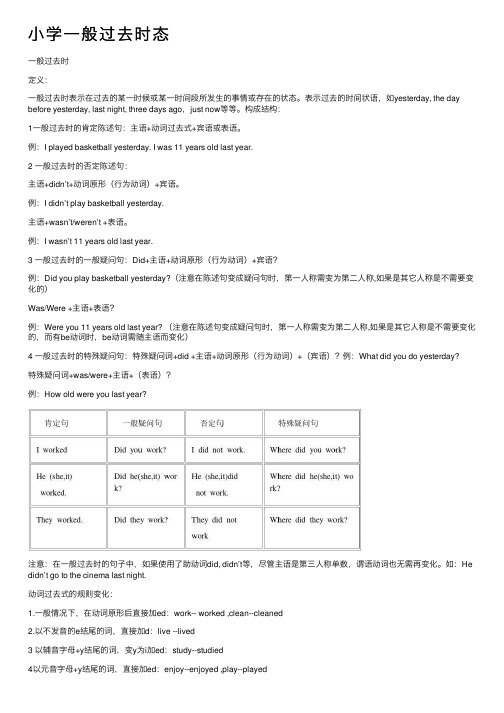
⼩学⼀般过去时态⼀般过去时定义:⼀般过去时表⽰在过去的某⼀时候或某⼀时间段所发⽣的事情或存在的状态。
表⽰过去的时间状语,如yesterday, the day before yesterday, last night, three days ago,just now等等。
构成结构:1⼀般过去时的肯定陈述句:主语+动词过去式+宾语或表语。
例:I played basketball yesterday. I was 11 years old last year.2 ⼀般过去时的否定陈述句:主语+didn’t+动词原形(⾏为动词)+宾语。
例:I didn’t play basketball yesterday.主语+wasn’t/weren’t +表语。
例:I wasn’t 11 years old last year.3 ⼀般过去时的⼀般疑问句:Did+主语+动词原形(⾏为动词)+宾语?例:Did you play basketball yesterday?(注意在陈述句变成疑问句时,第⼀⼈称需变为第⼆⼈称,如果是其它⼈称是不需要变化的)Was/Were +主语+表语?例:Were you 11 years old last year? (注意在陈述句变成疑问句时,第⼀⼈称需变为第⼆⼈称,如果是其它⼈称是不需要变化的,⽽有be动词时,be动词需随主语⽽变化)4 ⼀般过去时的特殊疑问句:特殊疑问词+did +主语+动词原形(⾏为动词)+(宾语)?例:What did you do yesterday?特殊疑问词+was/were+主语+(表语)?例:How old were you last year?注意:在⼀般过去时的句⼦中,如果使⽤了助动词did, didn’t等,尽管主语是第三⼈称单数,谓语动词也⽆需再变化。
如:He didn’t go to the cinema last night.动词过去式的规则变化:1.⼀般情况下,在动词原形后直接加ed:work-- worked ,clean--cleaned2.以不发⾳的e结尾的词,直接加d:live --lived3 以辅⾳字母+y结尾的词,变y为i加ed:study--studied4以元⾳字母+y结尾的词,直接加ed:enjoy--enjoyed ,play--played5 以重读闭⾳节(辅⾳+元⾳+辅⾳)结尾的词,双写最后的辅⾳字母+ed:stop--stopped不过许多常⽤的动词的过去式的变化都是不规则的,这就需要⼤家花时间逐个去记:have/has -- had,eat--ate, see—saw,am/is—was, are—were, go—went, do—did, take--took, run--ran, lend--lent, sleep--slept, get—got, meet—met, bring—brought, buy—bought, think—thought, say—said,give—gave, put—put, speak—spoke, teach—taught,write—wrote, wake—woke, fall—fell, know—knew等等同步测试:⼀、写出下列动词的过去式。
小学六年级英语语法四大时态句式转换

四大时态复习1. 一般现在时1一般现在时的构成肯定句☆be动词:主语+beam,is,are+其它;如:I am a boy.我是一个男孩;☆行为动词:主语+行为动词+其它;如:We study English.我们学习英语;☆当主语为第三人称单数he, she,it时,要在动词后加"-s"或"-es";如:Mary likes Chinese. 玛丽喜欢汉语;2一般现在时的变化☆. be动词的变化;否定句:主语+ be + not +其它;如:He is not a worker.他不是工人;一般疑问句:Be +主语+其它; 如:-Are you a student -Yes. I am. / No, I'm not.特殊疑问句:疑问词+一般疑问句;如:Where is my bike☆.行为动词的变化;否定句:主语+ don't doesn't +动词原形+其它;如:I don't like bread.当主语为第三人称单数时,要用doesn't构成否定句;如:He doesn't often play.一般疑问句:Do Does +主语+动词原形+其它;如:- Do you often play football- Yes, I do. / No, I don't.当主语为第三人称单数时,要用does构成一般疑问句;如:- Does she go to work by bike - Yes, she does. / No, she doesn't.特殊疑问句:疑问词+一般疑问句;如:How does your father go to work 动词+s的变化规则1.一般情况下,直接加-s,如:cook-cooks, milk-milks2.以s. x. sh. ch. o结尾,加-es,如:guess-guesses, wash-washes, watch-watches, go-goes 3.以“辅音字母+y”结尾,变y为i, 再加-es,如:study-studies2.现在进行时(1)一般现在时的构成:beam,is, are+ 动词的ing形式;如:I am reading. 我正在读书(2)现在进行时的否定句在be后加not,即beam,is, are + not + 动词的ing形式;如:She is not doing her homework now. 她现在没有做作业;(3)现在进行时的一般疑问句把be动词调到句首,即Beam,is, are + 人+ 动词ing形式;如:Are you drinking milk now 你现在在喝牛奶吗(4)现在进行时的特殊疑问的基本结构为:疑问词+ be + 人+ 动词ing如:Where are you going 你现在去哪但who当主语时其结构为:Who + be + 动词ing如:Who is talking to you 谁在和你说话动词加ing的变化规则1.一般情况下,直接加ing,如:cook-cooking2.以不发音的e结尾,去e加ing,如:make-making, taste-tasting3.如果末尾是一个元音字母和一个辅音字母,双写末尾的辅音字母,再加ing,如:run-running, stop-stopping3.一般将来时1一般将来时基本结构:①be going to + do动词原形;②will+ do动词原形.2否定句:在be动词am, is, are后加not或情态动词will后加not成won’t;结构为:beam, is, are + not + 动词原形will not + 动词原形will not = won’t例如:①I’m going to have a picnic this afternoon.→I’m not going to have a picnic this afternoon.②I will go shopping this weekend.→I will not go shopping this weekend.= I won’t go shopping this weekend.3一般疑问句:be或will提到句首,some改为any, and改为or,第一二人称互换;例如:①We are going to go on an outing this weekend.→Are you going to go on an outing this weekend②I will play football tomorrow afternoon.→Will you play football tomorrow afternoon4特殊疑问句①问人用Who例如:I’m going to New York soon. →Who’s going to New York soon.②问干什么用What …do.例如:My father is going to watch a race with me this afternoon.→What is your father going to do with you this afternoon.③问什么时候用When.例如:She’s going to go to bed at nine. →When is she going to bed4.一般过去时1.肯定句be动词在一般过去时中的变化:☆am 和is在一般过去时中变为was;was not=wasn’t☆are在一般过去时中变为were;were not=weren’t行为动词在一般过去时的句子中要变成过去式一般是在句子后面加ed(2)否定句:be动词变成was notwasn’t 或were not weren’t如:He wasn’t a teacher two years ago.didn’t +动词原形如:Jim didn’t go home yesterday.(3)一般疑问句有be动词的一般疑问句把was或were调到句首;如:Were you a teacher two years ago句中没有be动词的一般过去时的句子,在句首加did,句子中的动词过去式变回原形;如:Did Jim go home yesterday4特殊疑问句:①疑问词+did+主语+动词原形如:What did Jim do yesterday②疑问词是who时:疑问词+动词过去式如:Who went to home yesterday动词过去式变化规则:☆.一般在动词末尾加-ed,如:pull-pulled, cook-cooked☆.结尾是e加d,如:taste-tasted☆.末尾只有一个元音字母和一个辅音字母的重读闭音节,应双写末尾的辅音字母, 再加-ed,如:stop-stopped☆.以“辅音字母+y”结尾的,变y为i, 再加-ed,如:study-studied☆.不规则动词过去式:am,is-was, are-were, do-did, see-saw, say-said, give-gave, get-got, go-went, come-came, have-had, eat-ate, take-took,run-ran, sing-sang, put-put, make-made, read-read, write-wrote, draw-drew, drink-drank, fly-flew, ride-rode,speak-spoke, sweep-swept, swim-swam, sit-sat随堂练习一、写出下列动词的第三人称单数drink ________ go _______ stay ________ make ________ look _________ have_______ pass_______ carry ____ come________ watch______ plant_______ fly ________study_______ brush________ do_________ teach_______二、按照要求改写句子1. Daniel watches TV every evening.改为否定句___________________________________________________2. I do my homework every day.改为一般疑问句,作否定回答________________________________________________________3. She likes milk.改为一般疑问句,作肯定回答___________________________4. I like taking photos in the park.对划线部分提问________________________________________________________5. John comes from Canada.对划线部分提问___________________________________________________三.写出下列动词的现在分词:play________ run__________ swim _________make__________ go_________ like________ write________ _ski___________ read________ have_________ sing ________ dance_________ put_________ see________ buy _________ love____________ live_______ take_________ come ________ get_________ stop_________ sit ________ begin________ shop___________四、句型转换:1. They are doing housework .改成否定句_____________________________________________________________2.The students are cleaning the classroom . 改一般疑问句并作肯定和否定回答__________________________________________________________________________________________________________________________________3.I’m playing the football in the playground .对划线部分进行提问_________________________________________________________________4.Tom is reading books in his study . 对划线部分进行提问_________________________________________________________________五.填空;1. 我打算明天和朋友去野炊;I_____ _______ _________ have a picnic with my friends.I ________ have a picnic with my friends.2. 下个星期一你打算去干嘛我想去打篮球;What ________ ________ _________ _________ _________ next Monday I _______ ______ _____ play basketball.What _________ you do next Monday I ________ play basketball.3. 你妈妈这个周末去购物吗是,她要去买一些水果;_____ your mother _______ ________ go shopping this ___________ Yes, she _________.She ______ ________ __________ buy some fruit.4. 你们打算什么时候见面;What time _______ you _________ __________ meet5. Nancy is going to go camping.改否定Nancy ________ going to go camping.6. I’ll go and join them.改否定I _______ go ______ join them.7. I’m going to get up at 6:30 tomorrow.改一般疑问句________ _______ ________ to get up at 6:30 tomorrow8. We will meet at the bus stop at 10:30.改一般疑问句_______ ________ meet at the bus stop at 10:30.9. She is going to listen to music after school.对划线部分提问________ _______ she ________ ________ _________ after school10. My father and mother are going to see a play the day after tomorrow.对划线部分提问_________ _________ going to see a play the day after tomorrow.七.写出下列动词的过去式fly_______ plant________ are ________ drink_________ play_______ go________make ________ does_________ dance________ worry________ ask _____ taste_________ eat__________ draw________ put ______ throw________ kick_________ pass_______do ________八、句型转换1. It was exciting.否定句:________________________________________________一般疑问句:____________________________________________肯、否定回答:__________________________________________2. All the students were very excited.否定句:________________________________________________一般疑问句:____________________________________________肯、否定回答:__________________________________________3. They were in his pocket.否定句:________________________________________________一般疑问句:____________________________________________肯、否定回答:__________________________________________4. Su Hai took some photos at the Sports day.否定句:________________________________________________一般疑问句:____________________________________________肯、否定回答:__________________________________________5. Nancy went to school early.否定句:________________________________________________一般疑问句:____________________________________________肯、否定回答:__________________________________________6. We sang some English songs.否定句:________________________________________________一般疑问句:____________________________________________肯、否定回答:__________________________________________。
一般过去时态句型转换方法归纳
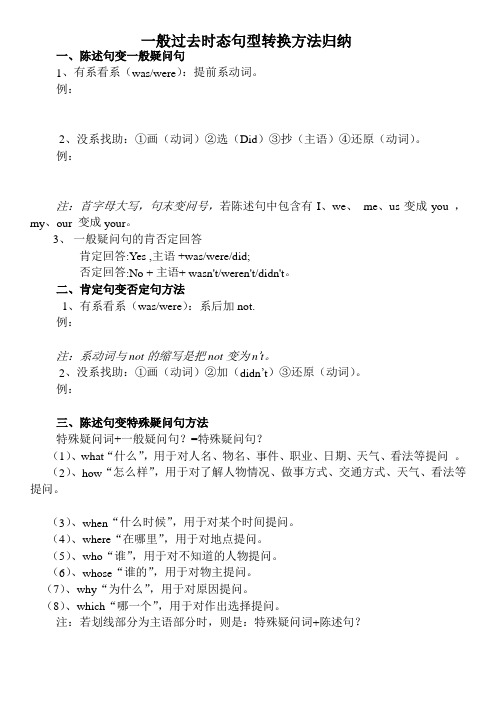
一般过去时态句型转换方法归纳
一、陈述句变一般疑问句
1、有系看系(was/were):提前系动词。
例:
2、没系找助:①画(动词)②选(Did)③抄(主语)④还原(动词)。
例:
注:首字母大写,句末变问号,若陈述句中包含有I、we、me、us变成you ,my、our 变成your。
3、一般疑问句的肯否定回答
肯定回答:Yes ,主语 +was/were/did;
否定回答:No + 主语+ wasn't/weren't/didn't。
二、肯定句变否定句方法
1、有系看系(was/were):系后加not.
例:
注:系动词与not的缩写是把not变为n’t。
2、没系找助:①画(动词)②加(didn’t)③还原(动词)。
例:
三、陈述句变特殊疑问句方法
特殊疑问词+一般疑问句?=特殊疑问句?
(1)、what“什么”,用于对人名、物名、事件、职业、日期、天气、看法等提问。
(2)、how“怎么样”,用于对了解人物情况、做事方式、交通方式、天气、看法等提问。
(3)、when“什么时候”,用于对某个时间提问。
(4)、where“在哪里”,用于对地点提问。
(5)、who“谁”,用于对不知道的人物提问。
(6)、whose“谁的”,用于对物主提问。
(7)、why“为什么”,用于对原因提问。
(8)、which“哪一个”,用于对作出选择提问。
注:若划线部分为主语部分时,则是:特殊疑问词+陈述句?。
小学英语语法一般过去式的句式变化
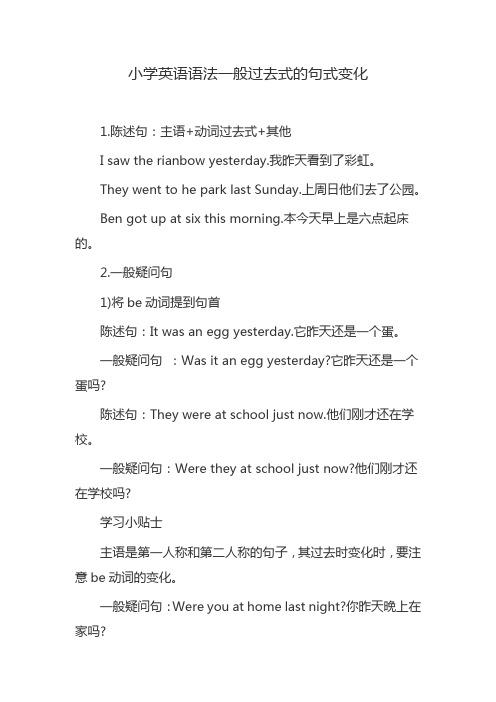
小学英语语法一般过去式的句式变化1.陈述句:主语+动词过去式+其他I saw the rianbow yesterday.我昨天看到了彩虹。
They went to he park last Sunday.上周日他们去了公园。
Ben got up at six this morning.本今天早上是六点起床的。
2.一般疑问句1)将be动词提到句首陈述句:It was an egg yesterday.它昨天还是一个蛋。
一般疑问句:Was it an egg yesterday?它昨天还是一个蛋吗?陈述句:They were at school just now.他们刚才还在学校。
一般疑问句:Were they at school just now?他们刚才还在学校吗?学习小贴士主语是第一人称和第二人称的句子,其过去时变化时,要注意be动词的变化。
一般疑问句:Were you at home last night?你昨天晚上在家吗?肯定回答:Yes,I was.否定回答:No,I wasn't.2)用助动词did陈述句:I did my homework at school,我在学校做了作业。
一般疑问句:Did you do your homework at school?你在学校做作业了吗?陈述句:They played basketball just now.他们刚才打了篮球。
一般疑问句:Did they play basketball just now?他们刚才打篮球了吗?学习小贴士由过去时态的陈述句变一般疑问句时,变化技巧上可以用拆分法,将动词过去式拆分为did+动词原形,然后将did提到句首,这样就不容易发生错误。
He slept a whole day.他睡了一整天。
第一步:先将slept拆分为did sleep第二步:将did提到句首变成:Did he sleep a whole day?他睡了一整天吗?3.否定句1)在be动词后面+not陈述句:I was a teacher twenty years ago.我20年前是一名老师。
小学英语语法一般过去时的句式变化(二)
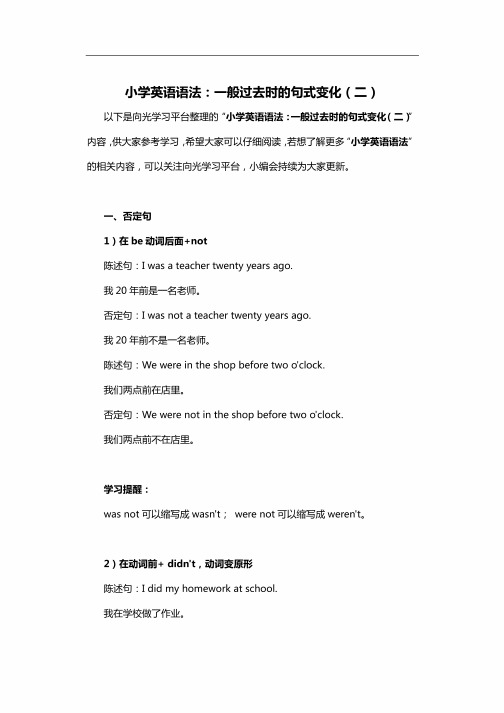
小学英语语法:一般过去时的句式变化(二)以下是向光学习平台整理的〃小学英语语法:一般过去时的句式变化(二y 内容,供大家参考学习,希望大家可以仔细阅读,若想了解更多〃小学英语语法"的相关内容,可以关注向光学习平台,小编会持续为大家更新。
否定句1)在be动词后面+not陈述句:I was a teacher twenty years ago.我20年前是一名老师。
否定句:I was not a teacher twenty years ago.我20年前不是一名老师。
陈述句:We were in the shop before two o'clock.我们两点前在店里。
否定句:We were not in the shop before two o'clock.我们两点前不在店里。
学习提醒:was not可以缩写成wasn't;were not可以缩写成weren't o2)在动词前+didn t,动词变原形陈述句:I did my homework at school.我在学校做了作业。
否定句:I didn't do my homework at school.我没有在学校做作业。
陈述句:They played basketball just now.他们刚才打了篮球。
否定句:They didn't play basketball just now.他们刚才没打篮球。
学习提醒:由过去时态的陈述句变否定句时,同样可以用拆分法,将动词过去式拆分为did+动词原形,然后在did后面+not,可缩写成didn't。
It dug a hole.它挖了一个洞。
第一步:先将dug拆分为did dig;第二步:在did后面+not,可缩写成didn't变成:It didn't dig a hole.它没有挖一个洞。
二,特殊疑问句(针对实义动词提问)特殊疑问词+助动词did+主语+动词原形+其他?1)针对动词提问What did Mike do this morning?迈克今天早晨做了什么?What did you do yesterday?你昨天做了什么?2)针对地点提问Where did they cook?他们在哪里做了饭?Where did he play badminton?他是在哪里打羽毛球?3)针对方式提问How did they go to school?他们是怎么去学校的?How did he get to the zoo?他是怎么到动物园的?4)针对时间提问When did he get up ?他是几点起床的?What time did you have the first class?你几点开始上第一节课?5)针对动词的对象提问What did she draw?她画了什么?What did he tell you?他告诉了你什么?学习提醒:★一般过去时态一般会与一些表示时间的词或短语连用。
小学英语一般过去时专项讲解、练习和参考答案
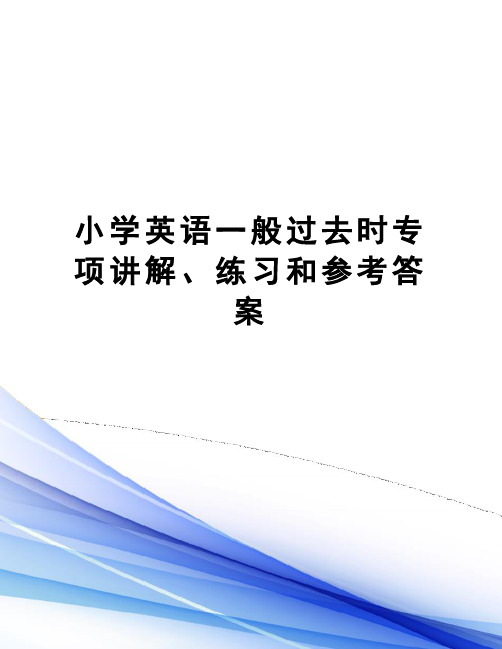
小学英语一般过去时专项讲解、练习和参考答案一般过去时专项讲解与练习一、概念:一般过去时表示过去某一时候发生的动作或存在的状态。
常与一般过去时连用的时间状语有:yesterday; 昨天just now刚才the day before yesterday;前天⋯⋯ago ⋯⋯之前(例如:三天前 three days ago )Last ⋯⋯上一个⋯(例如:上周星期天last Sunday )in 1990在1990年(in+过去时间)二、分类(一) be 动词的一般过去时:肯定句:主语 +be 动词的一般过去时( was/were)否定句:主语+be动词的一般过去时(was/were)+not一般疑问句: be 动词的一般过去时( was/were )+主语(二) there be结构的一般过去时与be 动词的一般过去时的变化基本一致。
(三)一般动词的过去时:肯定句:主语 +动词的过去时( I laughed.)否定句:主语 +did not+ 动词原形( I didn’t laugh.)一般疑问句: Did+主语 +动词原形( Did you laugh?)三.巧记 chant动词一般过去时,表示过去发生事;be 用 was 或用 were, have,has变had;谓语动词过去式,过去时间坐标志;一般动词加 -ed ,若是特殊得硬记。
否定句很简单,主语之后didn ’ t 添;疑问句也不难, did 放在主语前;如果谓语之前有 did ,谓语动词需还原;动词若是 was,were, 否定就把 not 添。
四、习题练习(一)用动词的适当形式填空:1.He ______ (work) in that bank four years ago.2.She ______ (live) in the US last Monday.3.I ______ (see) him yesterday.4.He _______(come) to school at 6 o’clock this morning.5.The boy _______ (have) a bad cold yesterday.6.When _______ you _______ (buy) that house?7.He _______(tell) a story to his daughter yesterday.8._____ you ____ (try) to call me last night?9.What _______you _______ (buy) in the shop?I ______ (buy) a coat just now.10. The doctor ______ (get) up late this morning.11.She ________ (paint) the wall last month.12.My mother _______ (be) a worker 20 years ago.13.________ (be) you here just now?No, I ________ (be not) here.14.Why _______ your brother _______ (cry) last night?15.It ______(be) my mother’s birthday yesterday.(二)翻译下列句子:1.我上周去看爷爷和奶奶了。
小学三年级英语一般过去时知识点及练习题
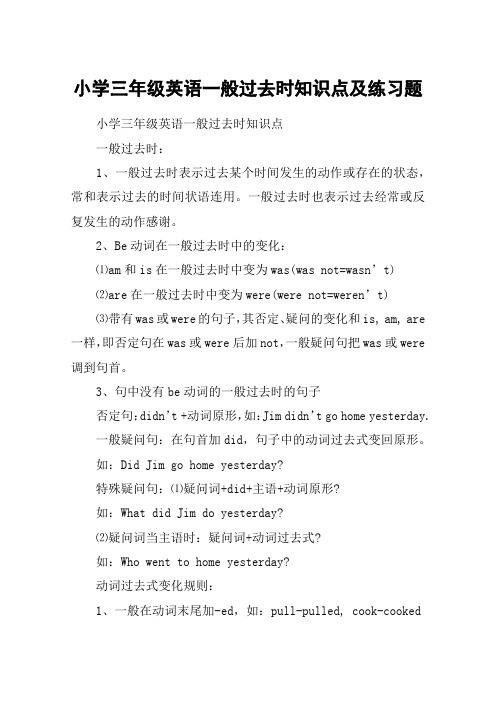
小学三年级英语一般过去时知识点及练习题小学三年级英语一般过去时知识点一般过去时:1、一般过去时表示过去某个时间发生的动作或存在的状态,常和表示过去的时间状语连用。
一般过去时也表示过去经常或反复发生的动作感谢。
2、Be动词在一般过去时中的变化:⑴am和is在一般过去时中变为was(was not=wasn’t)⑵are在一般过去时中变为were(were not=weren’t)⑶带有was或were的句子,其否定、疑问的变化和is, am, are 一样,即否定句在was或were后加not,一般疑问句把was或were 调到句首。
3、句中没有be动词的一般过去时的句子否定句:didn’t +动词原形,如:Jim didn’t go home yesterday.一般疑问句:在句首加did,句子中的动词过去式变回原形。
如:Did Jim go home yesterday?特殊疑问句:⑴疑问词+did+主语+动词原形?如:What did Jim do yesterday?⑵疑问词当主语时:疑问词+动词过去式?如:Who went to home yesterday?动词过去式变化规则:1、一般在动词末尾加-ed,如:pull-pulled, cook-cooked2、结尾是e加d,如:taste-tasted3、末尾只有一个元音字母和一个辅音字母的重读闭音节,应双写末尾的辅音字母,再加-ed,如:stop-stopped4、以“辅音字母+y”结尾的,变y为i,再加-ed,如:study-studied5、不规则动词过去式:am,is-was, are-were, do-did, see-saw, say-said, give-gave, get-got, go-went, come-came, have-had, eat-ate, take-took, run-ran, sing-sang, put-put, mak,e-made, read-read, write-wrote, draw-drew, drink-drank, fly-flew, ride-rode, speak-spoke, sweep-swept, swim-swam, sit-sat小学三年级英语一般过去时练习题一一、用be动词的适当形式填空1. I _______ an English teacher now.2. She _______ happy yesterday.3. They _______ glad to see each other last month.4. Helen and Nancy _______ good friends.5. The little dog _______ two years old this year.6. Look, there _______ lots of grapes here.7. There _______ a sign on the chair on Monday..8. Today _______ the second of June. Yesterday _______ the first of June. It _______ Children’s Day. All the students _______ very excited.二、句型转换1. There was a car in front of the house just now.否定句:______________________________________________一般疑问句:___________________________________________肯、否定回答:__________________________________________三、中译英1.我的故事书刚才还在手表旁边。
小学一般过去时
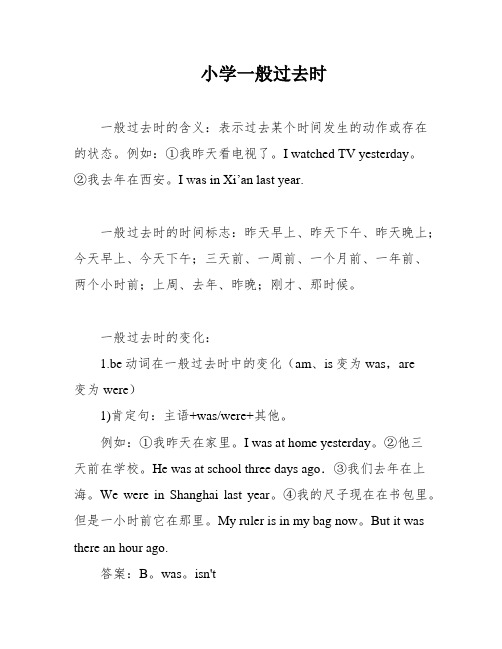
小学一般过去时一般过去时的含义:表示过去某个时间发生的动作或存在的状态。
例如:①我昨天看电视了。
I watched TV yesterday。
②我去年在西安。
I was in Xi’an last year.一般过去时的时间标志:昨天早上、昨天下午、昨天晚上;今天早上、今天下午;三天前、一周前、一个月前、一年前、两个小时前;上周、去年、昨晚;刚才、那时候。
一般过去时的变化:1.be动词在一般过去时中的变化(am、is变为was,are变为were)1)肯定句:主语+was/were+其他。
例如:①我昨天在家里。
I was at home yesterday。
②他三天前在学校。
He was at school three days ago.③我们去年在上海。
We were in Shanghai last year。
④我的尺子现在在书包里。
但是一小时前它在那里。
My ruler is in my bag now。
But it was there an hour ago.答案:B。
was。
isn't⑤我的笔十分钟前在桌子上。
但是现在它不在那里了。
My pen was on my desk ten minutes ago。
But it isn't there now.答案:A。
is。
wasn't2)否定句:主语+was/were+not+其他。
在was/were后加not,was not=wasn't;were not=weren't。
例如:①我昨天不在家里。
I wasn't at home yesterday。
②他三天前不在学校。
He wasn't at school three days ago.3.We were not in Shanghai last year。
(3) General ns: Did/ Were + subject + others。
六年级一般过去时句型变换
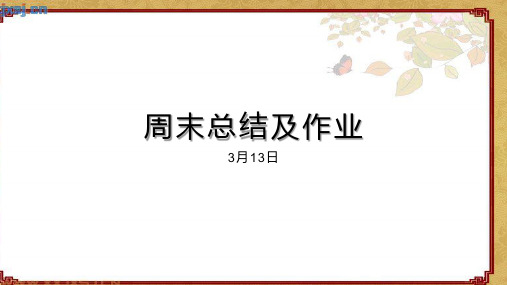
我上周末没看电视。
三、 一般疑问句“Did+主语+动词原形+其他 I watched TV last night.(变为一般疑问句) ----Did you watch TV last night?
肯定回答为 Yes,主语+did,否定回答为“No, 主语+didn't,
如:Yes,I did. / No,I didn't
2、He saw a film yesterday.(变为否定句) He didn't ssaewe a film yesterday
3、I played football this morning. (变为一般疑问句 ,并作肯定回答) Did you I played football this morning ?
周末总结及作业
3月13日
学过的不规则动词过去式
am is--was are--were do--did have has--had
是
是
助动词
有、吃
go--went read--read hurt--hurt can--cound
去
读
弄伤
能
see--saw drink--drank sleep--slept fall--fell
四、特殊疑问句:特殊疑问词+一 般疑问句? What did you do last weekend?
When did you watch TV?
Where did you go last weekend?
How did you go to school?
句型转换
1、Mary does her homework everyday. (用last night改写句子)。 Mary did her homework last night
小学一般过去式句型转换
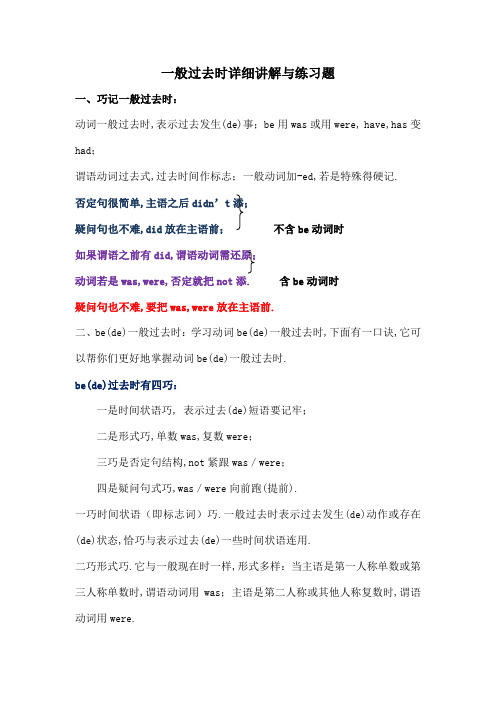
一般过去时详细讲解与练习题一、巧记一般过去时:动词一般过去时,表示过去发生(de)事;be用was或用were, have,has变had;谓语动词过去式,过去时间作标志;一般动词加-ed,若是特殊得硬记.否定句很简单,主语之后didn’t添;疑问句也不难,did放在主语前;不含be动词时如果谓语之前有did,谓语动词需还原;动词若是was,were,否定就把not添. 含be动词时疑问句也不难,要把was,were放在主语前.二、be(de)一般过去时:学习动词be(de)一般过去时,下面有一口诀,它可以帮你们更好地掌握动词be(de)一般过去时.be(de)过去时有四巧:一是时间状语巧, 表示过去(de)短语要记牢;二是形式巧,单数was,复数were;三巧是否定句结构,not紧跟was/were;四是疑问句式巧,was/were向前跑(提前).一巧时间状语(即标志词)巧.一般过去时表示过去发生(de)动作或存在(de)状态,恰巧与表示过去(de)一些时间状语连用.二巧形式巧.它与一般现在时一样,形式多样:当主语是第一人称单数或第三人称单数时,谓语动词用was;主语是第二人称或其他人称复数时,谓语动词用were.eg: I was in the classroom yesterday morning.昨天早上我在教室里.He was at school last Tuesday.上周二他在学校.They were over there a moment ago.刚才他们在那边.三巧否定句结构巧.与动词be(de)一般现在时一样,它在动词后面加not即可变成否定句,并且was, were与not可以缩写成wasn't, weren't.即:主语+ wasn't/ weren't +表语+其他.例如:I was not (=wasn't) here yesterday.昨天我不在这儿.My parents were not (=weren't) at home last Sunday.上周日我父母不在家.四巧疑问句式巧.把was, were提到句首,句末用问号即可变为一般疑问句.即:Was(Were) +主语+表语+其他这恰巧与动词be(de)一般现在时(de)疑问句式相似.例如:Were you at home the day before yesterday﹖前天你在家吗 Was she late this morning﹖今天早上她迟到了吗更巧(de)是疑问句(de)答语也相似,肯定回答用“Yes, 主语+was/were.”;否定回答用“No,主语+wasn't/weren't.”.eg:—Were Wei Hua and Han Mei here just now﹖刚才魏华和韩梅在这儿吗—Yes, they were. (No, they weren't.) 是(de),她们在.(不,她们不在.)动词过去式变化规则:1.一般在动词末尾加-ed,如:pull-pulled, cook-cooked2.结尾是e加d,如:taste-tasted3.末尾只有一个元音字母和一个辅音字母(de)重读闭音节,应双写末尾(de)辅音字母,再加-ed,如:stop-stopped4.以“辅音字母+y”结尾(de),变y为i, 再加-ed,如:study-studied 5.不规则动词过去式:am,is-was are-were do-did see-saw say-said give-gave get-got go-went come-came have-had eat-ate take-took run-ran sing-sang put-put make-made read-read write-wrote draw-drew drink-drank fly-flew ride-rode speak-spoke sweep-swept swim-swam sit-sat一、句型转换1. The children had a good time in the park.否定句: __________________________________________一般疑问句: __________________________________________对划线部分提问:__________________________________________2. There were about nine hundred people at the concert.(音乐会)否定句: __________________________________________一般疑问句: __________________________________________对划线部分提问:__________________________________________3. Ann did her homework yesterday evening.否定句: __________________________________________ 一般疑问句: __________________________________________ 对划线部分提问:__________________________________________ 4. Last week I read an English book.否定句: __________________________________________ 一般疑问句: ___________________________________________ 肯定/否定回答: __________________________________________ 对划线部分提问:__________________________________________ 5. My brother was in the park just now.否定句: __________________________________________ 一般疑问句: __________________________________________ 肯定/否定回答:___________________________________________ 对划线部分提问:____________________________________6. She had some bread for lunch yesterday.否定句:__________________________________________一般疑问句:________________________________________肯定/否定回答:____________________________________对划线部分提问:____________________________________7. They read English last night.否定句:__________________________________________一般疑问句:________________________________________肯定/否定回答:____________________________________对划线部分提问:____________________________________8. I was born in 2007.否定句:_____________________________________________一般疑问句:_________________________________________对划线部分提问:_____________________________________二、写出下列动词(de)过去式Is_______ are ________have _________want _______hear________Sit_______ watch _______play ______ enjoy _______do________ study ______dance _______like_______ live ________go ______buy ______ eat______ get _______ walk ______take______put _______run______ come_______ become________ fly________swim_______ find _______ begin______三、请用正确动词形式填空.1. I _________ (have) an exciting party last weekend.2. _________ she _________(practice) her guitar yesterday No, she _________.3. What ________ Tom ________ (do) on Saturday eveningHe ________(watch) TV and __________(read) an interesting book.4. They all _________(go) to the mountains yesterday morning.5. She _________(not visit) her aunt last weekend.She ________ (stay) at home and _________(do) some cleaning.6. When ________ you _________(write) this song I __________(write)it last year.7. My friend, Carol, ________(study) for the math test and ________(practice) English last night.8. ________ Mr. Li __________(do) the project on Monday morning Yes, he _________.9. How _________(be) Jim's weekend It _________(be not) bad.10. ________ (be) your mother a sales assistant last year No. she __________.四、改错题.1.How is Jane yesterday _____________________2.He go to school by bus last week. ____________________________ 3.He often goes home at 6:00 last month. _______________________ 4.I can fly kites seven years ago. ______________________________ 5.Did you saw him just now __________________________________ 6.Tom wasn’t watch TV last night. ______________________________ 7.I didn’t my homework yesterday. _____________________________ 8.He wait for you three hours ago. ______________________________。
六年级一般过去时

just now 刚才
• • 主语+谓语 •
• •
be动词(was,were) 助动词(did) 情态动词(could,might) 实义动词(有确切含义的动词,可
以单独做谓语,如:played 等)
例如: • They were happy. • He played football. • You did your homework.
used lived woke kept said cleaned bought played learnt/ed saw read stopped
ran run borrow borrowed grew grow watch watched wrote write smiled smile
open begin swim carry study finish
一般过去时
1.定义: 一般过去时态表示过去某个时 间发生的动作或存在的状态,在表 示过去一段时间内经常或反复发 生的动作或习惯状态,也用一般 过去时,在一般过去时,动词用 其过去式形式,不受主语人称和 数变化的影响。
谓语变化
规则动词过去式的构成
1、一般词尾加-ed。 stay→stayed help -- helped ask -- asked look→looked 2、e结尾的只加-d。 hope→hoped dance -- danced love -- loved live→lived
• III.句型转换 – They came to China in 1990.(变一般疑问句) Did come • __________ they ________ to China in 1990? • 2.I was ill for two days last week? (同上) • ________ Were you ill for two days last week? • 3. The twins go to school on foot every day. (同上) Do go • _________ the twins _______ to school on foot every day? • 4.She washed the clothes last Sunday. ( 变否定句) wash the clothes last Sunday • She _________ ________ didn’t
一般过去时句型转换(专项训练)-2023-2024学年人教PEP版英语六年级下册
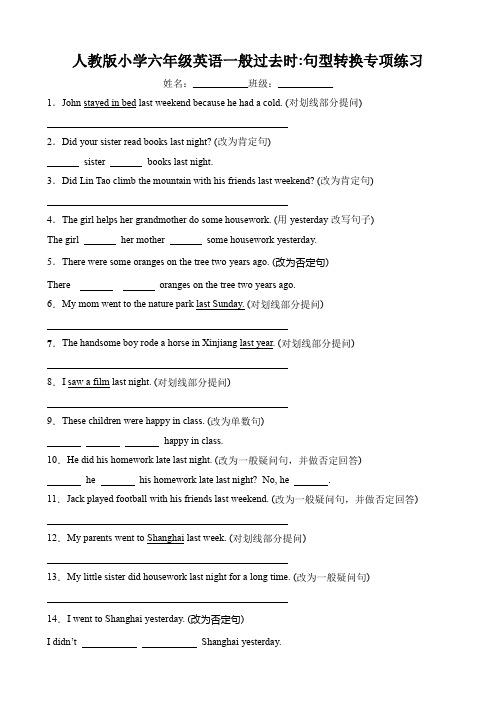
人教版小学六年级英语一般过去时:句型转换专项练习姓名:___________班级:___________1.John stayed in bed last weekend because he had a cold. (对划线部分提问)2.Did your sister read books last night? (改为肯定句)sister books last night.3.Did Lin Tao climb the mountain with his friends last weekend? (改为肯定句)4.The girl helps her grandmother do some housework. (用yesterday改写句子)The girl her mother some housework yesterday.5.There were some oranges on the tree two years ago. (改为否定句)There oranges on the tree two years ago.6.My mom went to the nature park last Sunday. (对划线部分提问)7.The handsome boy rode a horse in Xinjiang last year. (对划线部分提问)8.I saw a film last night. (对划线部分提问)9.These children were happy in class. (改为单数句)happy in class.10.He did his homework late last night. (改为一般疑问句,并做否定回答)he his homework late last night?No, he .11.Jack played football with his friends last weekend. (改为一般疑问句,并做否定回答) 12.My parents went to Shanghai last week. (对划线部分提问)13.My little sister did housework last night for a long time. (改为一般疑问句)14.I went to Shanghai yesterday. (改为否定句)I didn’t Shanghai yesterday.15.She is going to buy some cakes tomorrow. (用yesterday 改写句子)She some cakes yesterday.16.Amy liked playing the Erhu 3 years ago. (对划线部分提问)17.Amy liked playing football 2 years ago. (改为否定句)18.Did your father read books last night? (改为否定句)19.Did your mother read books last night? (改为肯定句)20.We liked English class 3 years ago. (改为否定句)21.Marry fell off her bike and hurt her feet 3 days ago. (对划线部分提问)22.We didn’t have a gym before. (改为肯定句)23.Zoom slept for a long time last winter. (改为否定句)Zoom for a long time last winter.24.They talked about the beautiful photos last music class. (改为否定句)25.We stayed in the hotel and watched TV yesterday morning. (对划线部分提问) 26.Our English teacher wore a beautiful dress yesterday. (对划线部分提问)27.My grandfather caught a lot of fish in the river yesterday afternoon. (对划线部分提问) 28.My uncles went fishing last Sunday. (改为否定句)。
小学一般过去式句型转换新版

一般过去时详细讲解与练习题一、巧记一般过去时:动词一般过去时,表示过去发生的事;be用was或用were, have,has变had;谓语动词过去式,过去时间作标志;一般动词加-ed,若是特殊得硬记。
否定句很简单,主语之后didn’t添;疑问句也不难,did放在主语前;不含be动词时如果谓语之前有did,谓语动词需还原;动词若是was,were,否定就把not添。
含be动词时疑问句也不难,要把was,were放在主语前。
二、be的一般过去时:学习动词be的一般过去时,下面有一口诀,它可以帮你们更好地掌握动词be的一般过去时。
be的过去时有四巧:一是时间状语巧,表示过去的短语要记牢;二是形式巧,单数was,复数were;三巧是否定句结构,not紧跟was/were;四是疑问句式巧,was/were向前跑(提前)。
【一巧】时间状语(即标志词)巧。
一般过去时表示过去发生的动作或存在的状态,恰巧与表示过去的一些时间状语连用。
【二巧】形式巧。
它与一般现在时一样,形式多样:当主语是第一人称单数或第三人称单数时,谓语动词用was;主语是第二人称或其他人称复数时,谓语动词用were。
eg: I was in the classroom yesterday morning.昨天早上我在教室里。
He was at school last Tuesday.上周二他在学校。
They were over there a moment ago.刚才他们在那边。
【三巧】否定句结构巧。
与动词be的一般现在时一样,它在动词后面加not即可变成否定句,并且was, were与not可以缩写成wasn't, weren't。
即:主语+ wasn't/ weren't +表语+其他。
例如:I was not (=wasn't) here yesterday.昨天我不在这儿。
My parents were not (=weren't) at home last Sunday.上周日我父母不在家。
小学一般过去式句型转换
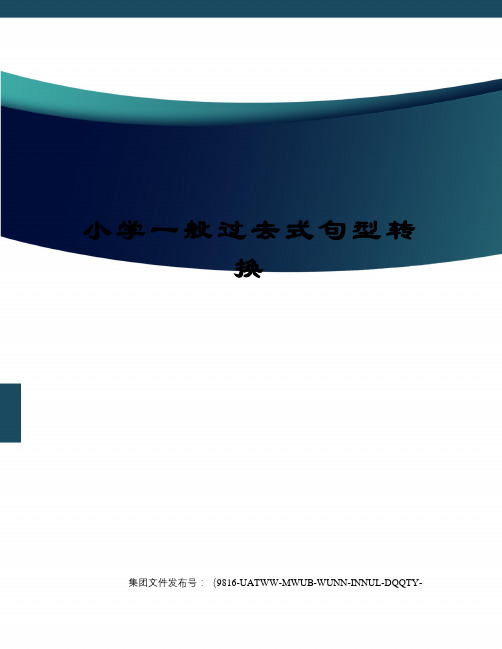
小学一般过去式句型转换集团文件发布号:(9816-UATWW-MWUB-WUNN-INNUL-DQQTY-一般过去时详细讲解与练习题一、巧记一般过去时:动词一般过去时,表示过去发生的事;be用was或用were, have,has变had;谓语动词过去式,过去时间作标志;一般动词加-ed,若是特殊得硬记。
否定句很简单,主语之后didn’t添;疑问句也不难,did放在主语前;不含be动词时如果谓语之前有did,谓语动词需还原;动词若是was,were,否定就把not添。
含be动词时疑问句也不难,要把was,were放在主语前。
二、be的一般过去时:学习动词be的一般过去时,下面有一口诀,它可以帮你们更好地掌握动词be的一般过去时。
be的过去时有四巧:一是时间状语巧,表示过去的短语要记牢;二是形式巧,单数was,复数were;三巧是否定句结构,not紧跟was/were;四是疑问句式巧,was/were向前跑(提前)。
【一巧】时间状语(即标志词)巧。
一般过去时表示过去发生的动作或存在的状态,恰巧与表示过去的一些时间状语连用。
【二巧】形式巧。
它与一般现在时一样,形式多样:当主语是第一人称单数或第三人称单数时,谓语动词用was;主语是第二人称或其他人称复数时,谓语动词用were。
eg: I was in the classroom yesterday morning.昨天早上我在教室里。
He was at school last Tuesday.上周二他在学校。
They were over there a moment ago.刚才他们在那边。
【三巧】否定句结构巧。
与动词be的一般现在时一样,它在动词后面加not即可变成否定句,并且was, were与not可以缩写成wasn't, weren't。
即:主语+ wasn't/ weren't +表语+其他。
例如:I was not (=wasn't) here yesterday.昨天我不在这儿。
小学英语语法:一般过去时
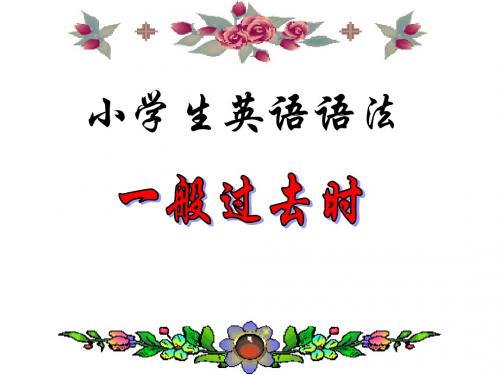
含有 be 动词的句型结构
一般现在时: 1)肯定式: 主语+be(am/is/are)+表语 2)否定式: 主语+be(am/is/are)+not+表语 3)一般疑问式: BE(Am Is Are)+主语+表语? 4)特殊疑问句: 疑问词+一般疑问式: 一般过去时: 1)肯定式: 主语+be(was/were)+表语. 2)否定式: 主语+be(was/were)+not+表语 3)一般疑问式: BE(Was Were)+主语+表语? 4)特殊疑问句: 疑问词+一般疑问式:
19) My sister _____ was (be) born on June 5. 1996.
20) Were _____ (be) your parents at home just now?
studied (study) French here last year. 21) He _______
三. 一般现在时和一般过去时句型结构的异与同
含有 be 动词的句型
• 一般现在时表示某人某 物现在的状态,性质 等.eg: I am a teacher now. She(He) is a singer. We They are happy. You • 一般过去时表示过去时间 内某人某物存在的状态, 性质等.eg: I was a teacher last year. She(He) was a singer. We You were happy. They
2.否定陈述句 主语 + wasn’t/weren’t + 其它 主语 + did not (didn‘t)+ 动词原形+其它
小学一般过去式句型转换
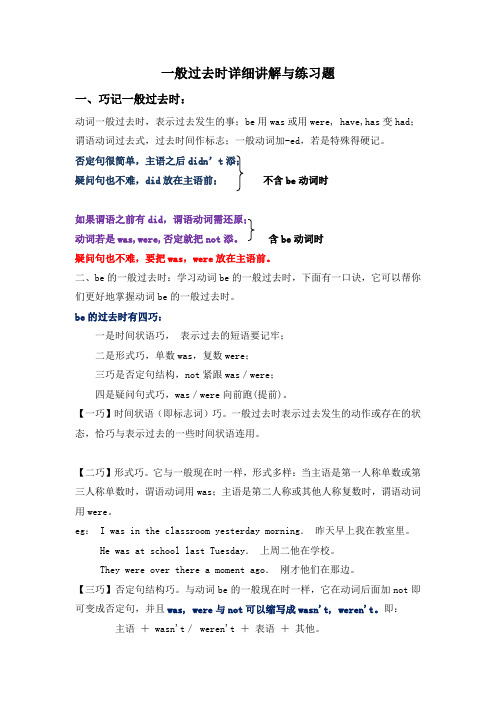
一般过去时详细讲解与练习题一、巧记一般过去时:动词一般过去时,表示过去发生的事;be用was或用were, have,has变had;谓语动词过去式,过去时间作标志;一般动词加-ed,若是特殊得硬记。
否定句很简单,主语之后didn’t添;疑问句也不难,did放在主语前;不含be动词时如果谓语之前有did,谓语动词需还原;动词若是was,were,否定就把not添。
含be动词时疑问句也不难,要把was,were放在主语前。
二、be的一般过去时:学习动词be的一般过去时,下面有一口诀,它可以帮你们更好地掌握动词be的一般过去时。
be的过去时有四巧:一是时间状语巧,表示过去的短语要记牢;二是形式巧,单数was,复数were;三巧是否定句结构,not紧跟was/were;四是疑问句式巧,was/were向前跑(提前)。
【一巧】时间状语(即标志词)巧。
一般过去时表示过去发生的动作或存在的状态,恰巧与表示过去的一些时间状语连用。
【二巧】形式巧。
它与一般现在时一样,形式多样:当主语是第一人称单数或第三人称单数时,谓语动词用was;主语是第二人称或其他人称复数时,谓语动词用were。
eg: I was in the classroom yesterday morning.昨天早上我在教室里。
He was at school last Tuesday.上周二他在学校。
They were over there a moment ago.刚才他们在那边。
【三巧】否定句结构巧。
与动词be的一般现在时一样,它在动词后面加not即可变成否定句,并且was, were与not可以缩写成wasn't, weren't。
即:主语+ wasn't/ weren't +表语+其他。
例如:I was not (=wasn't) here yesterday.昨天我不在这儿。
My parents were not (=weren't) at home last Sunday.上周日我父母不在家。
小学英语一般过去时语法详解
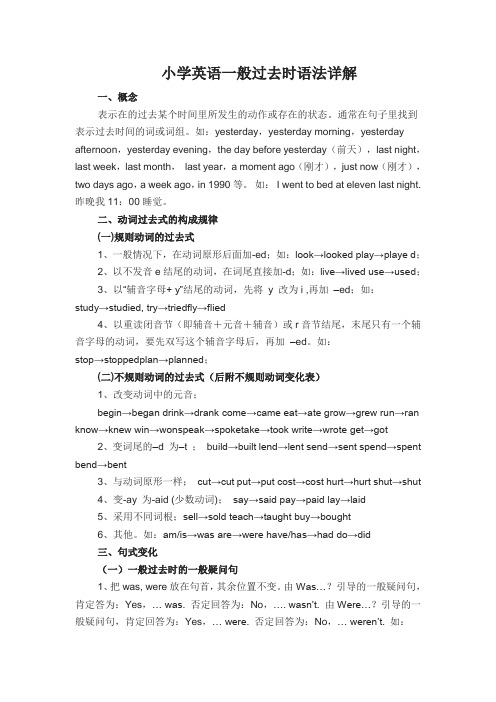
小学英语一般过去时语法详解一、概念表示在的过去某个时间里所发生的动作或存在的状态。
通常在句子里找到表示过去时间的词或词组。
如:yesterday,yesterday morning,yesterday afternoon,yesterday evening,the day before yesterday(前天),last night,last week,last month,last year,a moment ago(刚才),just now(刚才),two days ago,a week ago,in 1990等。
如:I went to bed at eleven last night.昨晚我11:00睡觉。
二、动词过去式的构成规律(一)规则动词的过去式1、一般情况下,在动词原形后面加-ed;如:look→looked play→playe d;2、以不发音e结尾的动词,在词尾直接加-d;如:live→lived use→used;3、以“辅音字母+ y”结尾的动词,先将y 改为i ,再加–ed;如:study→studied, try→triedfly→flied4、以重读闭音节(即辅音+元音+辅音)或r音节结尾,末尾只有一个辅音字母的动词,要先双写这个辅音字母后,再加–ed。
如:stop→stoppedplan→planned;(二)不规则动词的过去式(后附不规则动词变化表)1、改变动词中的元音;begin→began drink→drank come→came eat→ate grow→grew run→ran know→knew win→wonspeak→spoketake→took write→wrote get→got2、变词尾的–d 为–t ;bu ild→built lend→lent send→sent spend→spent bend→bent3、与动词原形一样;cut→cut put→put cost→cost hurt→hurt shut→shut4、变-ay 为-aid (少数动词);say→said pay→paid lay→laid5、采用不同词根;sell→sold teach→taught buy→bought6、其他。
- 1、下载文档前请自行甄别文档内容的完整性,平台不提供额外的编辑、内容补充、找答案等附加服务。
- 2、"仅部分预览"的文档,不可在线预览部分如存在完整性等问题,可反馈申请退款(可完整预览的文档不适用该条件!)。
- 3、如文档侵犯您的权益,请联系客服反馈,我们会尽快为您处理(人工客服工作时间:9:00-18:30)。
一般过去时详细讲解与练习题一、巧记一般过去时:动词一般过去时,表示过去发生的事;be用was或用were, have,has变had;谓语动词过去式,过去时间作标志;一般动词加-ed,若是特殊得硬记。
否定句很简单,主语之后didn’t添;疑问句也不难,did放在主语前;不含be动词时如果谓语之前有did,谓语动词需还原;动词若是was,were,否定就把not添。
含be动词时疑问句也不难,要把was,were放在主语前。
二、be的一般过去时:学习动词be的一般过去时,下面有一口诀,它可以帮你们更好地掌握动词be的一般过去时。
be的过去时有四巧:一是时间状语巧,表示过去的短语要记牢;二是形式巧,单数was,复数were;三巧是否定句结构,not紧跟was/were;四是疑问句式巧,was/were向前跑(提前)。
【一巧】时间状语(即标志词)巧。
一般过去时表示过去发生的动作或存在的状态,恰巧与表示过去的一些时间状语连用。
【二巧】形式巧。
它与一般现在时一样,形式多样:当主语是第一人称单数或第三人称单数时,谓语动词用was;主语是第二人称或其他人称复数时,谓语动词用were。
eg:I was in the classroom yesterday morning.昨天早上我在教室里。
He was at school last Tuesday.上周二他在学校。
They were over there a moment ago.刚才他们在那边。
【三巧】否定句结构巧。
与动词be的一般现在时一样,它在动词后面加not即可变成否定句,并且was, were与not可以缩写成wasn't, weren't。
即:主语+wasn't/weren't +表语+其他。
例如:I was not (=wasn't) here yesterday.昨天我不在这儿。
My parents were not (=weren't) at home last Sunday.上周日我父母不在家。
【四巧】疑问句式巧。
把was, were提到句首,句末用问号即可变为一般疑问句。
即:Was(Were) +主语+表语+其他这恰巧与动词be的一般现在时的疑问句式相似。
例如:Were you at home the day before yesterday﹖前天你在家吗Was she late this morning﹖今天早上她迟到了吗更巧的是疑问句的答语也相似,肯定回答用“Yes, 主语+was/were.”;否定回答用“No,主语+wasn't/weren't.”。
eg:—Were Wei Hua and Han Mei here just now﹖刚才魏华和韩梅在这儿吗—Yes, they were.(No, they weren't.) 是的,她们在。
(不,她们不在。
)动词过去式变化规则:1.一般在动词末尾加-ed,如:pull-pulled, cook-cooked2.结尾是e加d,如:taste-tasted3.末尾只有一个元音字母和一个辅音字母的重读闭音节,应双写末尾的辅音字母,再加-ed,如:stop-stopped4.以“辅音字母+y”结尾的,变y为i,再加-ed,如:study-studied5.不规则动词过去式:am,is-was are-were do-did see-saw say-said give-gave get-got go-went come-came have-had eat-ate take-took run-ran sing-sang put-put make-made read-read write-wrote draw-drew drink-drank fly-flew ride-rode speak-spoke sweep-swept swim-swam sit-sat一、句型转换1. The children had a good time in the park.否定句:__________________________________________ 一般疑问句:__________________________________________ 对划线部分提问:__________________________________________ 2. There were about nine hundred people at the concert.(音乐会)否定句:__________________________________________ 一般疑问句:__________________________________________ 对划线部分提问:__________________________________________ 3. Ann did her homework yesterday evening.否定句:__________________________________________ 一般疑问句:__________________________________________ 对划线部分提问:__________________________________________ 4. Last week I read an English book.否定句:__________________________________________ 一般疑问句:___________________________________________ 肯定/否定回答:__________________________________________ 对划线部分提问:__________________________________________ 5. My brother was in the park just now.否定句:__________________________________________ 一般疑问句:__________________________________________ 肯定/否定回答:___________________________________________ 对划线部分提问:____________________________________6. She had some bread for lunch yesterday.否定句:__________________________________________一般疑问句:________________________________________肯定/否定回答:____________________________________对划线部分提问:____________________________________*7. They read English last night.否定句:__________________________________________一般疑问句:________________________________________肯定/否定回答:____________________________________对划线部分提问:____________________________________8. I was born in 2007.否定句:_____________________________________________一般疑问句:_________________________________________对划线部分提问:_____________________________________ 二、写出下列动词的过去式Is_______ are ________have _________want _______hear________ Sit_______ watch _______play ______ enjoy _______do________ study ______dance _______like_______ live ________go ______ buy ______ eat______ get _______ walk ______take______put _______run______ come_______ become________ fly________ swim_______ find _______ begin______三、请用正确动词形式填空。
1. I _________ (have) an exciting party last weekend.2. _________ she _________(practice) her guitar yesterday?No, she _________.3. What ________ Tom ________ (do) on Saturday evening?He ________(watch) TV and __________(read) an interesting book.4. They all _________(go) to the mountains yesterday morning.5. She _________(not visit) her aunt last weekend.She ________ (stay) at home and _________(do) some cleaning.6. When ________ you _________(write) this song? I __________(write) it last year.7. My friend, Carol, ________(study) for the math test and ________(practice) English last night.8. ________ Mr. Li __________(do) the project on Monday morning? Yes, he _________.9. How _________(be) Jim's weekend? It _________(be not) bad.10. ________ (be) your mother a sales assistant last year? No. she __________.四、改错题.1.How is Jane yesterday? _____________________2.He go to school by bus last week. ____________________________ 3.He often goes home at 6:00 last month. _______________________ 4.I can fly kites seven years ago. ______________________________ 5.Did you saw him just now?__________________________________ 6.Tom wasn’t watch TV last night. ______________________________ 7.I didn’t my homework yesterday. _____________________________ 8.He wait for you three hours ago. ______________________________。
